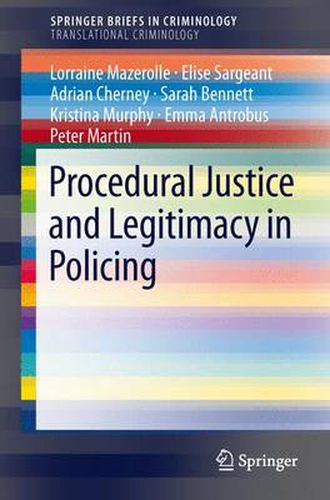Readings Newsletter
Become a Readings Member to make your shopping experience even easier.
Sign in or sign up for free!
You’re not far away from qualifying for FREE standard shipping within Australia
You’ve qualified for FREE standard shipping within Australia
The cart is loading…






This title is printed to order. This book may have been self-published. If so, we cannot guarantee the quality of the content. In the main most books will have gone through the editing process however some may not. We therefore suggest that you be aware of this before ordering this book. If in doubt check either the author or publisher’s details as we are unable to accept any returns unless they are faulty. Please contact us if you have any questions.
This brief focuses on the doing of procedural justice: what the police can do to implement the principles of procedural justice, and how their actions can improve citizen perceptions of police legitimacy. Drawing on research from Australia (Mazerolle et al), the UK (Stanko, Bradford, Jackson etc al), the US (Tyler, Reisig, Weisburd), Israel (Jonathon-Zamir et al), Trinidad & Tobago (Kochel et al) and Ghana (Tankebe), the authors examine the practical ways that the police can approach engagement with citizens across a range of different types of interventions to embrace the principles of procedural justice, including:
*
problem-oriented policing
*
patrol
*
restorative justice
*
reassurance policing
*
and community policing.
Through these examples, the authors also examine some of the barriers for implementing procedurally just ways of interacting with citizens, and offer practical suggestions for reform. This work will be of interest for researchers in criminology and criminal justice focused on policing as well as policymakers.
$9.00 standard shipping within Australia
FREE standard shipping within Australia for orders over $100.00
Express & International shipping calculated at checkout
This title is printed to order. This book may have been self-published. If so, we cannot guarantee the quality of the content. In the main most books will have gone through the editing process however some may not. We therefore suggest that you be aware of this before ordering this book. If in doubt check either the author or publisher’s details as we are unable to accept any returns unless they are faulty. Please contact us if you have any questions.
This brief focuses on the doing of procedural justice: what the police can do to implement the principles of procedural justice, and how their actions can improve citizen perceptions of police legitimacy. Drawing on research from Australia (Mazerolle et al), the UK (Stanko, Bradford, Jackson etc al), the US (Tyler, Reisig, Weisburd), Israel (Jonathon-Zamir et al), Trinidad & Tobago (Kochel et al) and Ghana (Tankebe), the authors examine the practical ways that the police can approach engagement with citizens across a range of different types of interventions to embrace the principles of procedural justice, including:
*
problem-oriented policing
*
patrol
*
restorative justice
*
reassurance policing
*
and community policing.
Through these examples, the authors also examine some of the barriers for implementing procedurally just ways of interacting with citizens, and offer practical suggestions for reform. This work will be of interest for researchers in criminology and criminal justice focused on policing as well as policymakers.